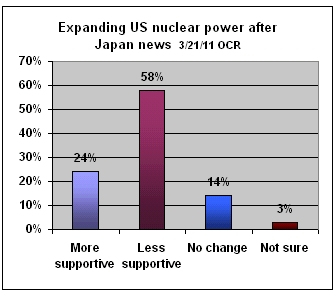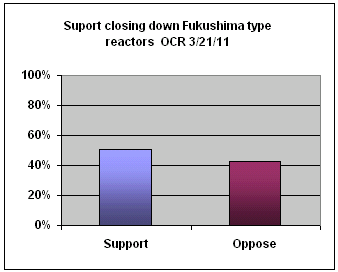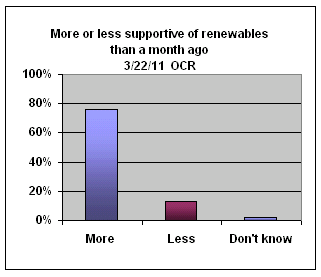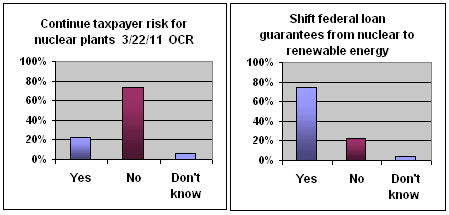Michael Collins

Citizen response to the disaster in Japan will have a major impact on future sources of power in the United States, our ability to live in a healthy environment, and the future of the nuclear power industry.
We do not yet know the outcome of the unfolding disaster at Fukushima I in Japan. There are conflicting stories about attempts to contain the reactors and public health hazards posed by this extreme nuclear event. At Zero Hedge, Tyler Durden has a breaking story on reactor number 1 at Fukushima that could have dire implications.
However, we are getting a glimpse of public reaction to the events in Japan. The Christian Science Monitor reported the results of a national survey on nuclear power conducted by OCR for the Civil Society Institute (March 15, 16-814 individuals).
The survey starts with a generic and a specific question about support for nuclear power in the US. The generic question was, "Would you say that you support or oppose more nuclear power reactors in the United?" The split was 46% in favor and 44% opposed. The graph above shows what happens when the phrase, "Thinking about the nuclear reactor crisis in Japan..." is followed by a statement about nuclear policy. Only 24% said they were "supportive" of expanding nuclear plants with 58% opposed expanding plants.
A later question in the survey narrows things down a bit. Respondents were asked, "Would you support or oppose a halt to the United States extending the operating lifespan of its oldest nuclear reactors?"

Even before the results are in on environmental damage from the Japanese disaster, by a 51% - 43% margin, the sample shows solid support for shutting down at least the 23 nuclear plants similar to Fukushima (which would seem to be the plants the question referenced).
The shift away from supporting nuclear power is in line with polls just days after Three Mile Island. A CBS-New York Times article showed the rapid shift in public opinion after the Three Mile Island partial meltdown hit the news. Public opinion went from 55%-33% in favor of a nuclear plant in their community to 56% opposed to 33% in favor. That's a 40% spread in opinion opposing nuclear power in just weeks of coverage of the Three Mile Island disaster.

There is much stronger support for renewable forms of energy - wind and solar - now than there was prior to the Japanese incident.

The president's American Power Act has huge taxpayer subsidies for nuclear power construction. This poll shows that his proposals may be dead. It will be interesting to watch how President Obama handles the post Fukushima endorsement of his nuclear power loan guarantees in light of this strong trend opposing that policy.

The opposition to federal support is now a generic opposition to federal programs, the poll indicates. The public favors a shift away from subsidies for nuclear energy to supports for renewables.
At least two key factors that will play a roll in determining the public stance on the ongoing use of nuclear power. They are:
1) The outcome of the current situation in Japan: If we have an environmental disaster that spreads to the hundreds of millions on Japan's main island or any nation beyond, public opinion should shift irretrievably negative on US nuclear power. If anti nuclear sentiment is this bad now, what will actual injuries and deaths do?
2) The ability to have a real dialog on the issue of nuclear power: There was considerable controversy over the outcome and impact of the Chernobyl disaster. The International Atomic Energy Agency that estimate up to 4,000 deaths as a result of the tragedy. A Greenpeace study found 200,000 likely deaths. An article from 2009 published by the New York Academy of Sciences is making the rounds now that claims the death toll at nearly one million. This authors argue that superior methodology and analysis support their claims. You should hear more about this in the near future.
Public skepticism about government and industry assurances regarding nuclear safety will be far greater after Fukushima I. In a generally industry friendly article after Three Mile Island, the New York Times quotes an Oregon woman living less than a mile from the Trojan nuclear plant. Asked about her confidence about information regarding nuclear safety, June Burnham said:
"I guess I really don't believe the 'official' word at all," the 48 year old [Oregon] woman said. "I suppose they tell us whatever is necessary to prevent panic." New York Times, April 29, 1979
Ms. Burnham would be glad to know that her views are now shared by the majority.
If the Greenpeace or Russian studies gain favor and there are likely injuries and casualties from Fukushima, it will be the end of nuclear power and those who so steadfastly and smugly supported it.
See polling data - After Fukushima: American Attitudes About Nuclear Power Policy Questions: A Survey Conducted for the Civil Society Institute, March 22, 2011 - OCR International
END
This article may be reproduced entirely or in part with attribution of authorship and a link to this article.

Comments
last status I saw they had connected the power
But also saw numerous high radiation readings.
We've seen on this site, massive denial on even the most basic elements of nuclear technology, i.e. that spent fuel rods are not safe...
unreal.
A Populist Moment
The spin zone has a huge footprint. How's that, two neologisms in one sentence.
The press back around Three Mile Island was a bit tamer than today's media. Too many smart people out there, although the dangers of this have not been examined to any degree of detail. Just a lot of spin.
This data indicates that we're having a populist moment, those periods when the public just gets it. It may or may not last but it's here now. There was a similar period prior to the invasion of Iraq when majorities of both parties opposed any invasion until weapons inspections confirmed that Hussein had WMD. The aftermath of this tragedy will be available for many to see, regardless of press focus.
Michael Collins
Let´s be realistic
It is almost natural behaviour of people to react negatively on some technological failure that can cause harm to man’s health. We should consider that this is temporary situation. Let’s be realistic because of this accident, nuclear plants will not be stopped or shut down. All we can do is to ask for higher security rules. We are still much depended on nuke energy.
You're right
As it stands now, this is transitory opinion. However, that presumes that the situation is resolved, that it's shown that everything was done properly in the most extraordinary set of circumstances, and that the health impact is minimal. It also presumes that the look back at Chernobyl that's resurfacing is buried or discredited.
It is worth imagining what will happen if the situation is not favorably resolved.
There is a very informative interview with Japanese author on the nuclear industry just out. It sheds light on what we know now about monitoring for radiation:
.
We're days or weeks away from understanding just the health impact.
Will they be able to repair the reactors or will they have to encase and 'bury' them? What will the health impact be? These are questions that will drive the outcome of public opinion on this.
Michael Collins
Let's not be in denial
Yes, it is natural for people to react negatively to being exposed to highly toxic poisons that will remain in the environment for hundreds or thousands of years. Funny that.
> We should consider that this is temporary situation.
Centuries or millennia are not "temporary" by any sane definition of that word.
> We are still much depended on nuke energy.
That's what the nuke lobby keeps telling us. Seems like Germany, Denmark, Scotland, Spain, Switzerland and a growing list of countries don't believe them.
We have all the clean, safe renewable energy we need. We don't need the catastrophic risks and highly toxic waste of nuclear.
Maybe. Maybe not.
"We have all the clean, safe renewable energy we need. We don't need the catastrophic risks and highly toxic waste of nuclear." -- BlueRock
Maybe. Maybe not. There are arguments on either side. It probably comes down to what is meant by "all the energy ... we need"? If we want not to be in denial, we should be thinking of what are the needs of world population projected out at least half a century and what is the development expectation for that world population. Even if we limit ourselves to planning just for the U.S.A. (and, IMO, that is what we should do), we still must consider global numbers and implications. It really isn't such an easy, open-and-shut case.
I don't know the answer about nuclear energy -- the crazy economics of it, the difficulty of any cost-benefit analysis. I don't get that far. What stops me is that I see the huge arsenals of nuclear weapons, and I wonder if industrial nuclear power, as such, is worth discussing.
If some extraterrestrial beings should be beaming down today, what would they think about this dominant, presumably intelligent species that cannot really explain to anyone (least of all themselves) why they are sitting on enough nuclear weapons to destroy all life on earth many times over. And then they expend more energy arguing over industrial nuclear power than they do considering the abolition of nuclear weapons!
James Lovelock, (probably the principal founder and promoter of the Gaia movement) begins his book, Revenge of Gaia (2006) with this quote:
Ye blind guides, which strain at a gnat, and swallow a camel. (King James Bible, Matthew 23:24)
Lovelock comes forward with a prescription for the current transitional period (about the next 50 years) that will see us safely into the next transitional period (from about 2060 out to sometime in the 22nd Century). His prescription is that the only way that the people of earth -- and perhaps the planet itself or herself (Lovelock uses feminine adjectives for Gaia) -- will be able to manage a "soft landing" to the industrial and post-industrial eras is to include nuclear fuel as a source of power to fill in as other available fuels are exhausted over the next half-century.
Those who favor Lovelock's idea may call it the "soft landing" strategy for the transitional period, that is, the period bridging industrial and post-industrial eras across to the beginning of an era when the people of Earth may manage a return to an era of relative stability and sustainability of human civilization on Earth.
Those who oppose Lovelock's idea call it "Lovelock's Folly."
(Both those who oppose and those who agree are part of what we can call the "Green Community" or "Green Movement," that is, they are all environmentalists and see things from an ecological point of view.)
Here is a link to Lovelock's book (American edition), available as PDF through the Scribd service --
Lovelock's Revenge of Gaia via Scribd.com
Here is the other side, a paper from the website TransitionCulture that is a book review of Lovelock's work, the review being titled 'Lovelock's Folly' --
'Lovelock's Folly' (review of Lovelock's book)
This may seem pretty weird to an American audience, but I believe that these arguments are well-known and have been debated widely in Europe, from France to Russia, over the last five years. Considering the Japanese disaster, those who talk of 'Lovelock's Folly' have likely won the latest round in the ongoing match.
It's hard for Americans to understand European govenments with their proportional representation and multiple parties, including such as the still very important Green Party in Germany (essential to any Social Democratic majority, when that rolls around again). Just like here in the U.S., European democracies are currently struggling with immigration issues, upsetting established political parties and alignments.
Here's background on Gaia:
Gaia is a hypothesis or a social movement, or both. As an hypothesis, Gaia is like environmentalism (activist ideology), but as an hypothesis, Gaia is like ecology (branch of science studying living phenomena or living beings in their environments and their environments as wholes). The hypothesis of Gaia is a matter for scientific debate. The movement of Gaia is a grand narrative or ideology.
The hypothesis springs from systems theory and goes like this: there is a Earth system, which is a living system (see, Fritjof Capra's The Web of Life) in the sense that it behaves as a unitary integral self-regulating system, comprised of physical, biological and human components, with feedback loops and whatever else systems engineers and scientists like to see when they study systems.
The ideology of Gaia goes a little farther, believing that Earth is a living system with some kind of intelligence or ability to adapt to changes in a way that we can only call intelligence, or perhaps 'soul'.
Where is the economic aspect in all this?
I think it is important to follow and to understand the energy debates and discussions going on around us and throughout the world. I wish we had a congress and administration (and SCOTUS) that would get us through elementary decisions about finance and economics -- rational decisions that should not be impossible for a government truly in tune with the common interests and views of the people of this nation -- rather than playing politics with their ideological agendas, vying for huge political donations from foreign-international-transnational special interests, putting the credit of the United States at risk (lip service to the fictional debt ceiling), and, doing nothing for necessary reforms.
That's why I think this topic is legitimate here at EP. It's one of the things that we, as a nation, should be discussing, if we could ever get beyond the logjam that gives us constant bad news on jobs, for small business, on infrastructure, for trade imbalances and national accounts.
Texas nuclear plant expansion in doubt CNN Money
Texas nuclear plant expansion in doubt CNN Money
By Charles Riley, staff reporter March 23, 2011: 1:48 PM ET
NEW YORK (CNNMoney) -- Utility company NRG has put the brakes on a plan to build two new nuclear reactors at its South Texas plant, CEO David Crane said Wednesday.
High levels of uncertainty in the aftermath of Japan's nuclear disasters have led the company to limit work on the project to the licensing and securing of federal loan guarantees, Crane said.
No new nuclear plant has won final approval in the United States since the Three Mile Island accident in 1979, although site work is being done at a couple of locations around the country.
Eighty miles southeast of Houston, NRG (NRG, Fortune 500) wants to expand its nuclear facility from two reactors to four -- in part with financing from Tokyo Electric Power Company, the owner of the Fukushima Daiichi plant that was heavily damaged in Japan's earthquake and tsunami.
----------------------
Vox populi
Michael Collins
Fukushima Engineer -- Helped Cover Up Flaw at Dai-Ichi Reac
Fukushima Engineer Says He Helped Cover Up Flaw at Dai-Ichi Reactor March 22, Bloomberg
One of the reactors in the crippled Fukushima nuclear plant may have been relying on flawed steel to hold the radiation in its core, according to an engineer who helped build its containment vessel four decades ago.
Mitsuhiko Tanaka says he helped conceal a manufacturing defect in the $250 million steel vessel installed at the Fukushima Dai-Ichi No. 4 reactor while working for a unit of Hitachi Ltd. (6501) in 1974. The reactor, which Tanaka has called a “time bomb,” was shut for maintenance when the March 11 earthquake triggered a 7-meter (23-foot) tsunami that disabled cooling systems at the plant, leading to explosions and radiation leaks.
“Who knows what would have happened if that reactor had been running?” Tanaka, who turned his back on the nuclear industry after the Chernobyl disaster, said in an interview last week. “I have no idea if it could withstand an earthquake like this. It’s got a faulty reactor inside.”
Tanaka’s allegations, which he says he brought to the attention of Japan’s Trade Ministry in 1988 and chronicled in a book two years later called “Why Nuclear Power is Dangerous,” have resurfaced after Japan’s worst nuclear accident on record. The No. 4 reactor was hit by explosions and a fire that spread from adjacent units as the crisis deepened.
Michael Collins
The Fukushima Deuterium Bomb
The decay and fatigue of metal is well understood science. Nuke plant operators since ths 70's have noticed that all the plumbing in nuke plants crystallizes at an accelerated rate. That's right, pipes made of glass extruding a shit-stew of uranium and plutonium. So Fukushima was doomed to fail as all old reactors.
When the plutonium reactor exploded, the radiation spiked. Plutonium for this reactor came from bomb material sold by George H.W. Bush in 1992. Many tons loaded on a single boat and shipped. Japanese figured how to recycle plutonium after many mishaps.
When the coolant was lost, the water hydrolyzed into oxygen and hydrogen. The part not reported by the mainstream media is that much of the hydrogen turned to deuterium. The force of the reactor explosion was partially deuterium.
Let's recall the the III Reich worked exclusively on a deuterium bomb until the Norway plant was destroyed by British Commandos in late 1943. Nazis were a few months away from sufficient deuterium for a bomb.
Burton Leed
1250 times legal limit, "nothing to worry about"
The WSJ has a radiation report that the sea around the plant is 1250 times the legal limit on radiation and then the "spokesperson" claims this is "safe" and not a "threat to human health".
And they wonder why no one believes them. WSJ.